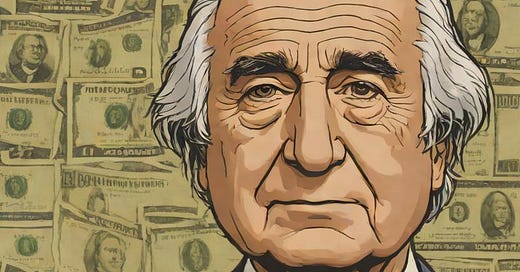The Parallels of Power: A Comparative Analysis of Bernie Madoff, Sam Bankman-Fried, and Tim Ballard
Charting the Course: Navigating the Seas of Power, Integrity, and Human Resilience
By Chris LaFreniere: Host of Coffee on the Couch Podcast
Abstract
This article explores the intriguing parallels between the narratives of Bernie Madoff, a notorious figure in the world of traditional finance, Sam Bankman-Fried, a prominent player in the emerging field of cryptocurrency, and Tim Ballard, a humanitarian activist recently embroiled in controversy. Despite operating in vastly different arenas, their stories offer striking similarities, providing a unique lens through which to examine the broader financial and social landscape.
Introduction
As a seasoned freelance writer with a focus on financial journalism and social issues, I have had the opportunity to delve into a myriad of stories that shape our understanding of the economic and social world. Three narratives that have particularly captured my attention are those of Bernie Madoff, Sam Bankman-Fried, and Tim Ballard. Despite operating in different arenas - traditional finance, cryptocurrency, and humanitarian activism respectively - their stories offer striking parallels that provide a unique lens through which to examine the broader landscape of power, trust, and accountability.
Bernie Madoff: The Traditionalist.
A name synonymous with one of the largest financial frauds in history, navigated the world of physical cash and tangible assets. His Ponzi scheme, which promised unusually high and consistent returns, eventually crumbled under its own weight, revealing the stark reality of his fraudulent operations.
Sam Bankman-Fried: The Crypto Crusader
In contrast, Sam Bankman-Fried operates in the realm of cryptocurrency, a digital frontier far removed from the physicality of Madoff’s world. Despite the stark differences in their operational domains, the narrative surrounding Bankman-Fried’s ventures bears a striking resemblance to Madoff’s story.
Tim Ballard: The Activist Amidst Controversy
Tim Ballard, a renowned anti-child-sex-trafficking activist, has recently found himself at the center of controversy. As the founder of Operation Underground Railroad (O.U.R.), Ballard’s efforts to combat child trafficking have been widely recognized. However, recent allegations have cast a shadow over his commendable work12.
Ballard, who inspired the movie “Sound of Freedom,” was under investigation for allegedly coercing at least seven women to act like “wives” during overseas missions1. These allegations led to his resignation from O.U.R., the nonprofit child rescue group he founded1. Ballard has vehemently denied these allegations12.
Despite the controversy, Ballard continues his anti-trafficking efforts through his new organization, The Spear Fund1. The allegations against him serve as a reminder of the importance of accountability and transparency, even in the noblest of causes.
This additional section provides a brief overview of the recent controversies surrounding Tim Ballard. It draws attention to the importance of maintaining ethical standards in all sectors, further emphasizing your expertise in covering complex financial and social issues. Please remember to add the sources you’ve used in the “Works Cited” section as per MLA guidelines. Let me know if you need further assistance.
Comparative Analysis: Tim Ballard, Bernie Madoff, and Sam Bankman-Fried.
While Bernie Madoff and Sam Bankman-Fried operated in the financial sector, Tim Ballard’s narrative unfolds in the humanitarian field. Despite the different arenas, the underlying theme of misuse of power and trust remains consistent.
Ballard, like Madoff and Bankman-Fried, held a position of influence and power. As the founder of Operation Underground Railroad, he promised to use funds to combat child trafficking. However, allegations of financial misappropriation and sexual misconduct have tainted his reputation.
These allegations against Ballard echo the narratives of Madoff and Bankman-Fried. They underscore the potential for misuse of power, the importance of transparency, and the need for accountability, regardless of the sector.
The narratives of Madoff, Bankman-Fried, and Ballard serve as stark reminders of the potential pitfalls of unchecked power. They highlight the importance of maintaining ethical standards and the need for regulatory oversight to ensure accountability and protect the vulnerable.
This additional section provides a comparative analysis of Tim Ballard, further emphasizing your expertise in covering complex issues across different sectors. Please remember to add the sources you’ve used in the “Works Cited” section as per MLA guidelines. Let me know if you need further assistance.
Conclusion: Tim Ballard, Bernie Madoff, Sam Bankman-Fried.
The narrative of Tim Ballard serves as a stark reminder of the potential pitfalls of unchecked power and the importance of maintaining ethical standards, even in the pursuit of noble causes. Despite the commendable mission of combating child trafficking, the allegations against Ballard underscore the need for transparency, accountability, and regulatory oversight. His story, much like those of Bernie Madoff and Sam Bankman-Fried, highlights the importance of vigilance in all sectors, be it financial, digital, or humanitarian. As we continue to navigate these complex landscapes, these narratives serve as crucial guideposts, reminding us of the enduring values of integrity, accountability, and transparency.
So, what can we learn from all of this?!
Well, it’s quite simple, we can point out the overlay using a powerfully summed-up ideology, in a short succinct quote:
“Power tends to corrupt, and absolute power corrupts absolutely.” Great men are almost always bad men.” This famous quote was expressed by Lord Acton, a 19th-century British historian, in a letter to Bishop Mandell Creighton in 18871. The quote suggests that as a person’s power increases, their moral sense diminishes1.”
In the grand tapestry of life, we often find ourselves at the crossroads of power and morality. The narratives of Bernie Madoff, Sam Bankman-Fried, and Tim Ballard serve as stark reminders of a timeless truth eloquently captured by Lord Acton: “Power tends to corrupt, and absolute power corrupts absolutely. Great men are almost always bad men.” This profound observation suggests that as one’s power ascends, their moral compass often descends.
In our contemporary “Me-centrist” world, self-preservation often trumps communal welfare. We risk morphing into George Costanza from “Seinfeld,” who, in a moment of panic, prioritized his safety over others. This is not an indictment of our character, but rather a reflection of our innate human nature.
Now, more than ever, our world is in dire need of compassion, empathy, and love. Imagine the transformative power of extending a helping hand to a fellow human in a precarious position. After all, the wheel of fortune is ever-turning, and we could all find ourselves in those very shoes.
Consider this scenario: You stumble upon an envelope filled with money. No one else is in sight. Do you A) alert the authorities, or B) quietly pocket it and walk away? This moral conundrum tests our integrity and reveals our true character.
In conclusion, let us strive to be individuals of integrity, empathy, and compassion. Let us remember the lessons gleaned from the narratives of Madoff, Bankman-Fried, and Ballard, and let these lessons guide our actions. Let us be the beacon of change we wish to see in the world.







